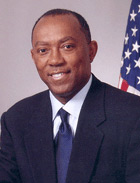I’m shocked, shocked to find that there are partisan interests in the Mayoral runoff.
Even though Houston elections officially are nonpartisan, the contest between Bill King and Sylvester Turner has evolved into a test of party might as voters prepare to elect the Bayou City’s first new mayor in six years.
King has framed the runoff as the choice between a businessman and a career politician, a common appeal by Republican candidates against Democratic incumbents. Trying to paint King as too extreme for Houston, Turner’s campaign has taken to invoking the tea party and Texas Sen. Ted Cruz, the latter-day bogeymen of the Democratic Party.
Meanwhile, the local Republican and Democratic parties have endorsed their favorites and affiliated groups are gearing up their ground games to phone bank and knock on doors for their preferred candidates.
The result is a race without overt party identification, but with all of the trappings of a partisan battlefield.
“We’ve seen across the country the intensity of the partisan division grow,” University of Houston political scientist Richard Murray said. “It’s not that the overall population has become more partisan and polarized, but people who vote, particularly in a low-turnout election like a Houston mayor runoff, tend to be partisans.”
Murray said he expects turnout to be about 20 percent in the Dec. 12 runoff to replace term-limited Mayor Annise Parker, down from 27 percent on Nov. 3.
[…]
Murray said the race is more partisan than usual for city races, attributing the dynamic in part to the equal rights ordinance thought to have brought many conservative Republicans to the polls.
“It’s not surprising that the Democrats particularly, since they have a significant edge in partisanship within the city, would try to make this a partisan race,” Murray said. “And Republicans hope that they can counter and in a low-turnout election get enough of their partisans to go to the polls to squeak out a win.”
I will note that 20% turnout for the runoff will equate to over 190,000 votes, which would be higher turnout than the 2013 or 2009 November races. The 2003 runoff had 220,725 votes, while the 2001 runoff had 326,254 votes. I feel confident saying we won’t reach that level. Both races were D versus R like this one, with Bill White winning by a huge margin in 2003 and Lee Brown squeaking by in 2001. The latter election had “first Latino Mayor of Houston” possibilities (so did the 2003 one, but by then the shine had largely come off of Orlando Sanchez), and it was heavily polarized by race. This runoff certainly won’t reach 2001 levels, and probably won’t reach 2003 levels, but I doubt it will be low enough for it to be particularly favorable to Republicans. I’ll say again, I think for King to win he’s got to blunt Turner’s appeal outside of his African-American base. That was the intent of the Bell endorsement, except that a large number of Bell voters were repulsed by it. The partisans are going to turn out, as they always have in these races. If Democrats of all stripes back Turner, he ought to win. If King can cut into that enough, he can win. That’s how I see it.
And before anyone bemoans all those dirty partisans besmirching their innocent non-partisan city race, please note that there are also significant policy differences between the two. HERO, the revenue cap, and Rebuild Houston are the headliners for that, but the list doesn’t end there. I for one would rather have a Metro Board Chair nominated by Turner than one nominated by King. It’s not like these guys largely agree on things and it’s just a matter of whose flag they fly. Sylvester Turner’s Houston and Bill King’s Houston will be different places. By all means, base your choice on that. From my perspective at least, the two roads lead to the same destination.

